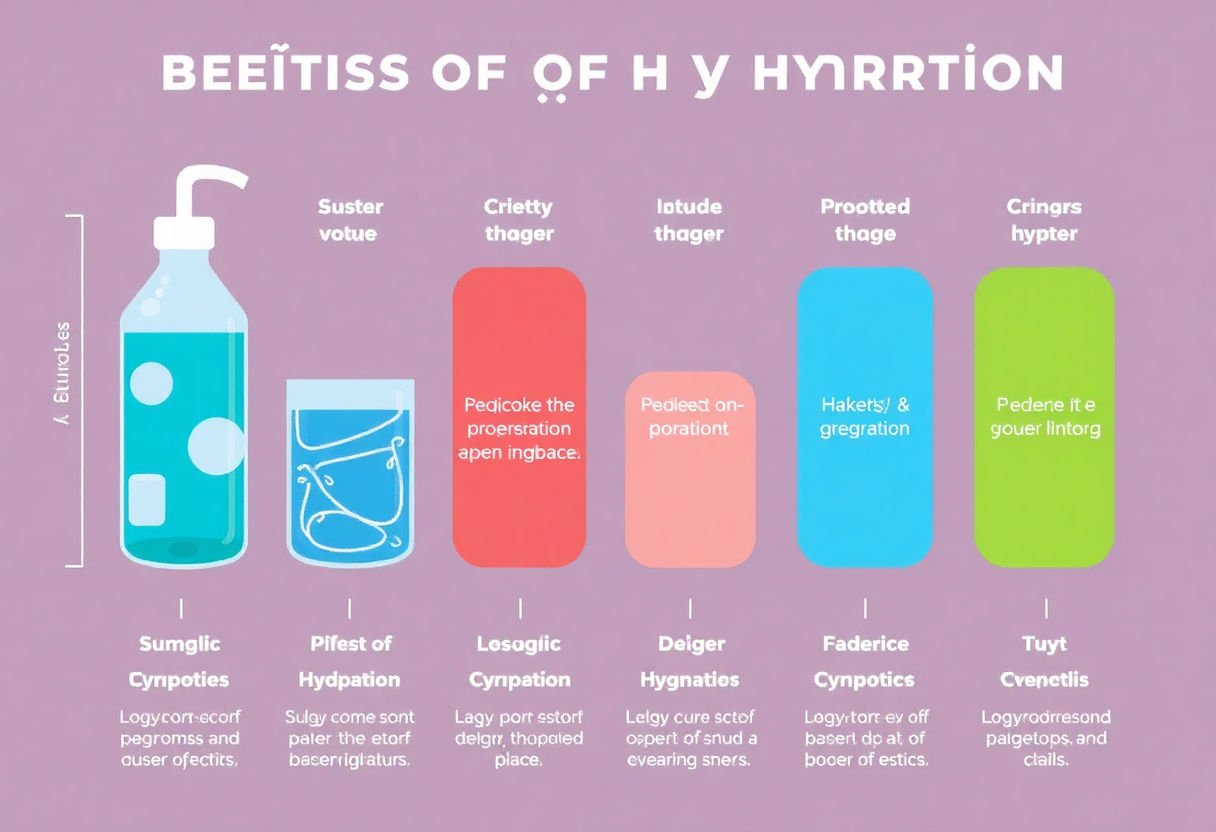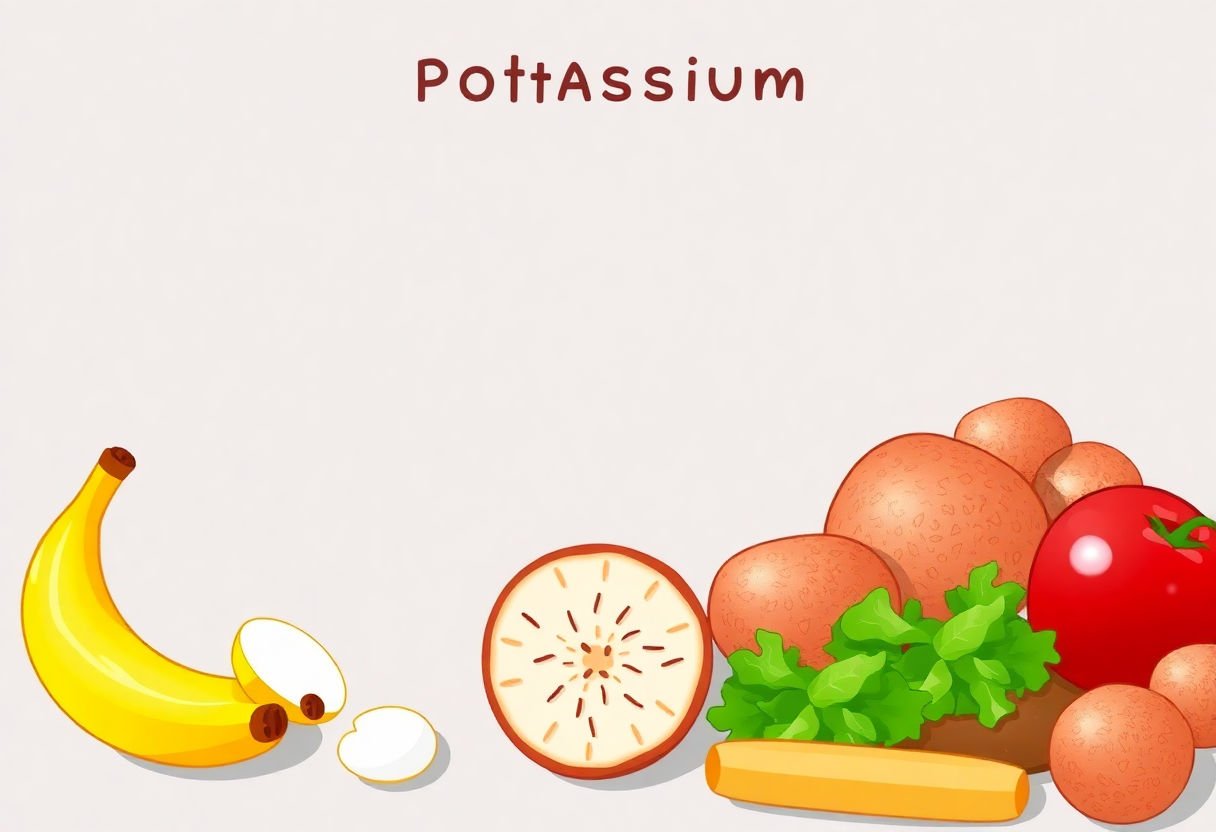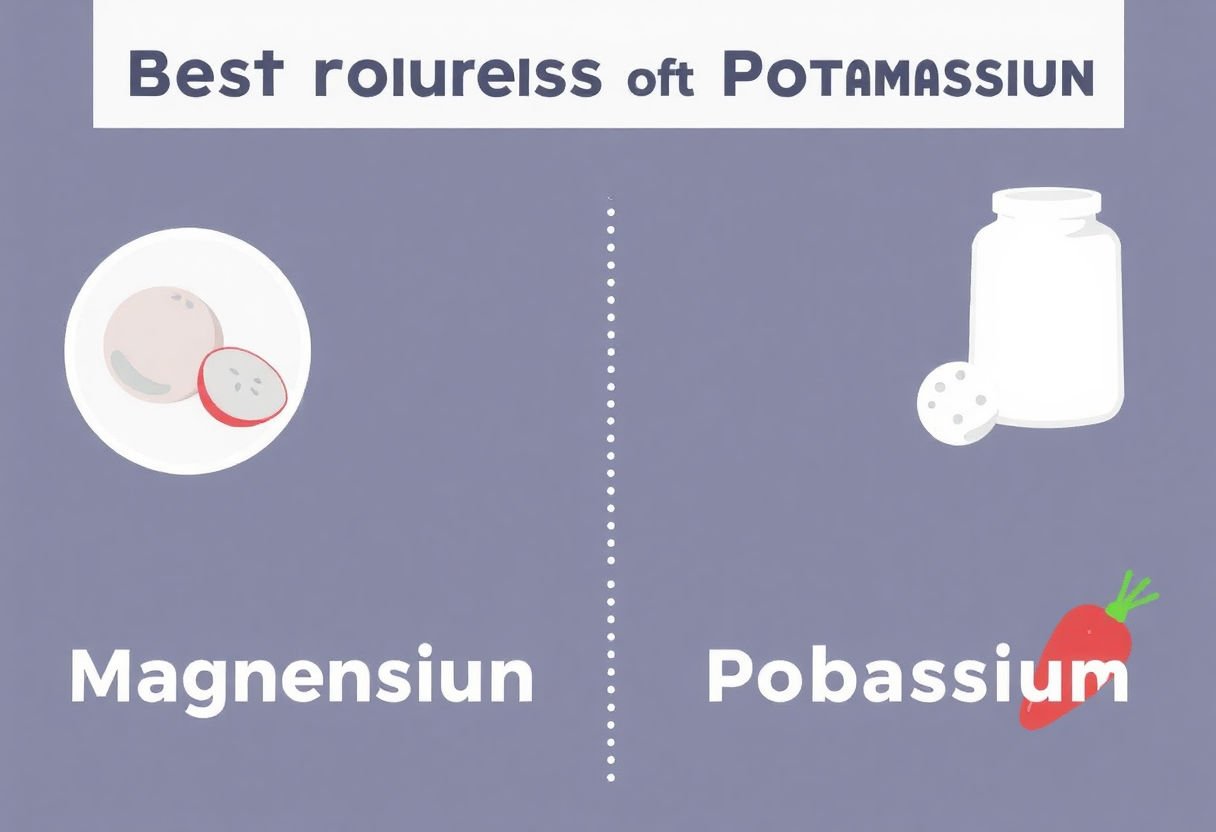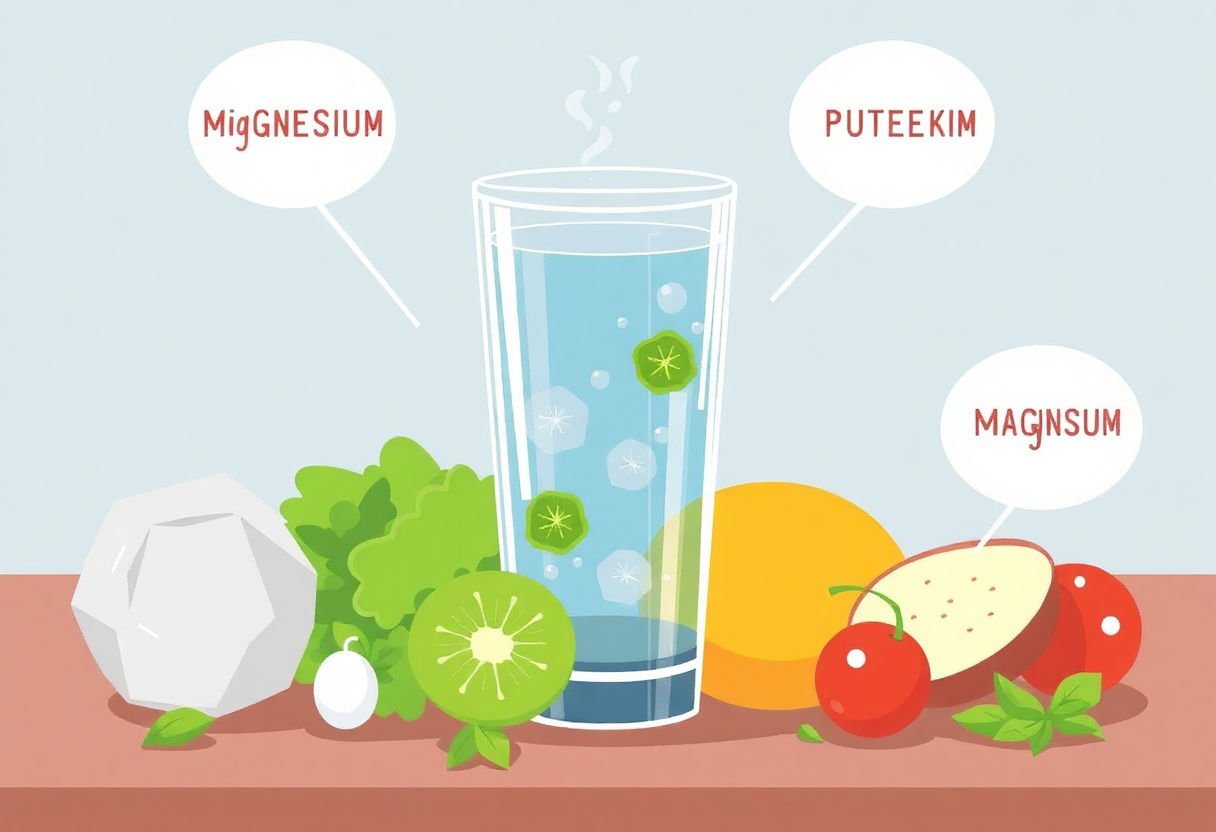Hydration is a cornerstone of well-being, influencing everything from physical performance to cognitive clarity. Yet, achieving optimal hydration requires more than just water. Minerals like magnesium and potassium play crucial roles in maintaining fluid balance within the body. This article delves into the significance of these minerals, exploring their impact on health, recommended daily intake, and sources. Understanding their roles can enhance overall wellness, ensuring the body functions efficiently. Through a detailed examination, this guide offers valuable insights into maintaining electrolyte balance and preventing deficiencies, empowering you to remain hydrated and healthy.
Key Takeaways
- Magnesium and potassium are vital in maintaining optimal hydration and fluid balance within the body.
- Both minerals support overall health, enhancing muscle function, heart health, and cognitive performance.
- Adequate intake of magnesium and potassium is essential to prevent deficiencies which can lead to serious health issues.
- Incorporating a balanced diet rich in these minerals can significantly contribute to improved hydration and wellness.
- Understanding and balancing daily requirements for magnesium and potassium can help sustain long-term health benefits.
The Importance of Hydration

Staying hydrated is fundamentally crucial for maintaining optimal health and well-being. Hydration plays a pivotal role in regulating body temperature, transporting nutrients, and removing waste products from the body. Furthermore, it significantly enhances physical performance, ensuring that the body functions efficiently during exercise and everyday activities. Dehydration can lead to a notable decline in performance, causing fatigue, reduced endurance, and impaired motor skills.
Cognitive function is equally affected by hydration levels. Water is essential for maintaining concentration and cognitive tasks. Even mild dehydration can lead to difficulties in focus, short-term memory challenges, and a negative impact on mood. Research has shown that maintaining proper hydration is vital for students and professionals alike to enhance mental clarity and productivity.
In addition, hydration is indispensable for healthy skin. Adequate fluid intake results in improved skin elasticity and complexion, while dehydration can cause dryness and accelerate the appearance of wrinkles. Hydration also supports cardiovascular health by aiding the heart in pumping blood more efficiently and facilitating the transport of oxygen throughout the body.
Moreover, staying hydrated helps to prevent headaches, which are often linked to dehydration. Thus, drinking sufficient fluids can reduce the frequency and severity of these discomforts.
In summary, maintaining appropriate hydration levels is essential not only for physical health but for mental and emotional well-being as well. It supports a myriad of bodily functions, showcasing the profound importance of consuming adequate fluids daily.
Role of Electrolytes in Hydration
Electrolytes are essential minerals that possess an electric charge, playing a fundamental role in maintaining the body’s fluid balance and ensuring proper hydration. Among these, magnesium and potassium are pivotal in managing hydration at the cellular level.
Electrolytes regulate the movement of water within the body by controlling osmosis—the process by which water moves across cell membranes. This regulation is crucial in retaining appropriate amounts of water in cells, tissues, and organs, thereby supporting the body’s overall function.
Magnesium is indispensable for biochemical reactions involved in muscle contractions and nerve function. It assists in the transportation of calcium and potassium ions across cell membranes, which is vital for electrical nerve impulse conduction and muscle contraction. In this manner, magnesium helps to maintain the balance of fluids, ensuring proper hydration and muscle efficiency.
On the other hand, potassium plays a critical role in cellular fluid balance. As one of the principal electrolytes inside cells, it works hand in hand with sodium to maintain a neutral charge across cell membranes. This balance not only supports heart function and blood pressure regulation but also ensures muscles and nerves operate efficiently. Adequate levels of potassium are crucial in offsetting the effects of high sodium intake, often associated with dehydration.
Incorporating adequate magnesium and potassium into the diet is essential in promoting hydration and supporting the body’s physiological processes. Together, they enhance the body’s capability to sustain fluid equilibrium and avert dehydration-related issues.
Magnesium: Benefits Beyond Hydration
Magnesium is a powerhouse mineral that supports a range of bodily functions beyond its well-documented role in hydration. Often overlooked, its myriad benefits extend to various facets of health, making it an essential component of a balanced diet.
One of the pivotal roles of magnesium is in muscle function. Magnesium acts as a natural muscle relaxant, helping to prevent cramps and spasms, which are particularly common after intense physical activity. By facilitating muscle contraction regulation, it contributes to better endurance and reduced fatigue during exercise.
Equally significant is magnesium’s impact on heart health. Studies suggest that adequate magnesium levels can help in regulating heartbeat and maintaining healthy blood pressure levels. It supports the function of the heart muscle and is involved in the synthesis of proteins and nucleic acids, which are vital for cardiovascular health.
Moreover, magnesium is essential for bone health. While calcium often takes the spotlight, magnesium contributes to bone structure and plays a role in the activation of vitamin D, which is crucial for bone mineralization. Sufficient magnesium intake can help reduce the risk of osteoporosis and bone fractures.
Furthermore, magnesium aids in nervous system regulation. It is involved in the synthesis of neurotransmitters and can have calming effects on the brain, potentially reducing symptoms of anxiety and promoting better sleep quality.
For those conscious of their overall health, magnesium offers benefits in energy production as well. It’s a key player in the conversion of food into energy, ensuring the body has enough fuel for daily activities. By supporting various enzymatic reactions, magnesium maintains energy efficiency and combats fatigue, underpinning general well-being and vitality.
Potassium: Essential for Every Cell

Potassium plays a crucial role in maintaining optimal cell function, serving as a key mineral required for various physiological processes. Found in every cell throughout the body, potassium is chiefly responsible for maintaining intracellular fluid balance, thereby supporting essential cellular activities. Its importance to the body’s hydration system cannot be overstated, as it works synergistically with sodium to regulate fluid levels and ensure proper nerve signal transmission.
One of the predominant functions of potassium is its role in nerve function and muscle contraction. It helps transmit electrical impulses that drive muscle movements, including those of the heart, making it vital for cardiovascular health. Potassium aids in the prevention of conditions such as hypertension, potentially reducing the risk of heart disease and stroke.
Furthermore, potassium is involved in maintaining the body’s acid-base balance. It does so by working with bicarbonate and other electrolytes to manage the pH levels of the blood, helping to safeguard against metabolic imbalances.
The daily recommended intake of potassium is approximately 2,500 to 3,000 milligrams for adults. To meet these needs, a diet rich in fruits and vegetables such as bananas, oranges, potatoes, and spinach can be beneficial. Inclusion of these potassium-rich foods is essential for maintaining the mineral’s optimal levels, thereby supporting cellular function and overall hydration.
An adequate intake of potassium not only contributes to better physical health but also enhances cognitive function by supporting efficient brain cell activities. Thus, retaining a balanced potassium level is imperative for sustaining body health and vitality.
Daily Requirements and Sources

To maintain optimal hydration and support overall health, daily intake recommendations for magnesium and potassium are crucial. For adults in the United States, the Recommended Dietary Allowance (RDA) for magnesium is approximately 400-420 mg for men and 310-320 mg for women. As for potassium, the Adequate Intake (AI) is about 2,500-3,000 mg per day; however, some health guidelines suggest an intake as high as 4,700 mg to promote cardiovascular and metabolic health.
Sourcing these minerals from a well-balanced diet can help meet these requirements effectively. Magnesium-rich foods include:
- Leafy green vegetables like spinach and kale, renowned for their nutritional density.
- Nuts and seeds such as almonds, cashews, and chia seeds, providing a robust magnesium boost.
- Whole grains, including brown rice and quinoa, contributing to daily magnesium intake.
Potassium sources are equally varied and include:
- Fruits, particularly bananas, oranges, and melons, offering a quick potassium-rich snack.
- Vegetables like potatoes, sweet potatoes, and broccoli, enriching the diet with essential potassium.
- Legumes and beans, such as lentils and kidney beans, also serve as excellent sources.
Incorporating a mix of these foods into daily meals not only helps attain the necessary levels of magnesium and potassium but also enhances overall nutritional diversity. Prioritizing a dietary approach over supplements ensures better absorption and utilization of these critical minerals, fostering both effective hydration and comprehensive health benefits.
Signs of Deficiency

Magnesium and potassium deficiencies can significantly impact your health, leading to various symptoms that warrant attention. Understanding these signs can empower you to make necessary dietary adjustments or seek medical advice.
A magnesium deficiency, or hypomagnesemia, can manifest in numerous ways:
- Muscle Cramps and Spasms: Magnesium is crucial for muscle relaxation, and low levels can cause frequent cramps and spasms.
- Fatigue and Weakness: The body’s energy production is impaired without sufficient magnesium, often resulting in exhaustion.
- Numbness and Tingling: These sensations, particularly in the extremities, indicate an electrolyte imbalance.
- Abnormal Heart Rhythms: Magnesium impacts heart function, and a deficiency might lead to arrhythmias.
Conversely, potassium deficiency, known as hypokalemia, presents different symptoms:
- Constipation: Potassium is essential for digestive movement, and deficiency can slow this process.
- Muscle Weakness and Cramps: Similar to magnesium, insufficient potassium affects muscle health.
- Palpitations: An irregular heartbeat can arise from low potassium levels, posing serious health risks.
- Mood Changes: Potassium has a role in nerve function, and its deficiency might trigger mood swings or irritability.
The potential health risks associated with these deficiencies are severe. Chronic deficiencies might lead to more significant cardiovascular issues or bone metabolism disorders. It’s vital to monitor and manage your intake of these minerals to maintain optimal bodily functions and good health. Recognizing and addressing these signs early can mitigate long-term health concerns and enhance your overall well-being.
Balancing Magnesium and Potassium Intake

Achieving a harmonious balance between magnesium and potassium intake is essential for maintaining optimal health and hydration. These two crucial minerals complement each other and play significant roles in numerous physiological processes. Ensuring an appropriate intake of both can contribute greatly to their effectiveness in sustaining your body’s fluid equilibrium.
Strategies for Balancing Intake
-
Diversify Your Diet: Incorporate a variety of foods rich in both minerals. Magnesium can be found in leafy greens, nuts, seeds, and whole grains, while potassium is abundant in bananas, oranges, potatoes, and beans.
-
Monitor Your Levels: Awareness of your body’s magnesium and potassium levels can help in adjusting dietary habits accordingly. Regular check-ups and blood tests are advised to avoid imbalances.
-
Supplements: In some cases, dietary supplements might be necessary, especially for individuals with dietary restrictions or health conditions that hinder absorption. Consulting a healthcare provider before starting any supplementation is imperative.
Recognizing the Importance of Balance
An imbalance between magnesium and potassium can contribute to various health issues. A deficiency in magnesium, for instance, can exacerbate potassium deficiency and vice versa, leading to symptoms like muscle cramps, fatigue, and cardiac issues. Thus, understanding the synergy between these minerals helps in maintaining a stable internal environment.
Incorporating these strategies into daily habits ensures that your body can efficiently utilize magnesium and potassium, thus enhancing both hydration levels and overall well-being. This balance is not only pivotal for hydrating effectively but also for supporting numerous bodily functions across all vital systems.
Conclusion
In summary, the significance of magnesium and potassium in maintaining hydration and overall wellness cannot be overstated. These essential minerals not only support fluid balance but also enhance critical bodily functions, from muscle health to heart performance. As people become more aware of their daily mineral intake, they have the opportunity to address potential deficiencies through dietary adjustments. Prioritizing a diet rich in magnesium and potassium paves the way for improved health outcomes and heightened physiological resilience. Embrace this informed approach to nutrition to sustain hydration and boost comprehensive well-being in the future.
Frequently Asked Questions
How do magnesium and potassium support hydration?
Magnesium and potassium are essential electrolytes that help regulate the body’s fluid balance. They assist in transporting nutrients into cells and removing waste, which supports optimal hydration and overall cellular health.
Can I get enough magnesium and potassium from my diet alone?
Yes, you can obtain sufficient amounts of magnesium and potassium from a balanced diet rich in natural sources like leafy greens, nuts, seeds, bananas, and potatoes. However, if dietary intake is not enough, supplements may be necessary under professional guidance.
What are the symptoms of magnesium and potassium deficiency?
Common symptoms of deficiency include muscle cramps, fatigue, irregular heartbeat, and, in severe cases, neurological disruptions. If any of these symptoms are experienced regularly, it is advisable to consult a healthcare professional.
Is it possible to consume too much magnesium and potassium?
While rare from dietary sources alone, excessive intake from supplements can lead to adverse effects such as gastrointestinal disturbances for magnesium and heart-related issues for potassium. Monitoring and balancing intake are crucial.
How do these minerals affect athletic performance?
Magnesium and potassium play a significant role in muscle function and energy production, which are critical for athletes. Adequate levels can enhance performance, reduce fatigue, and support quicker recovery after exercise.
